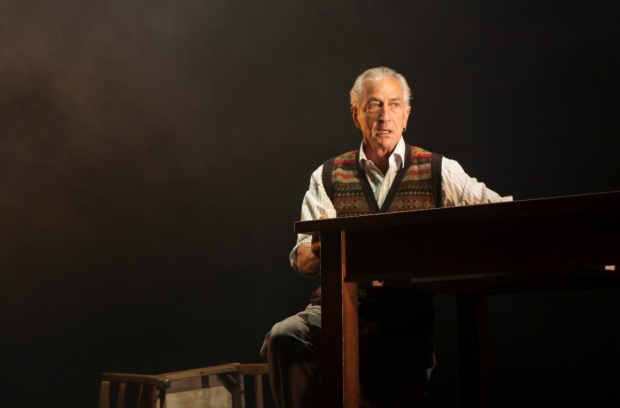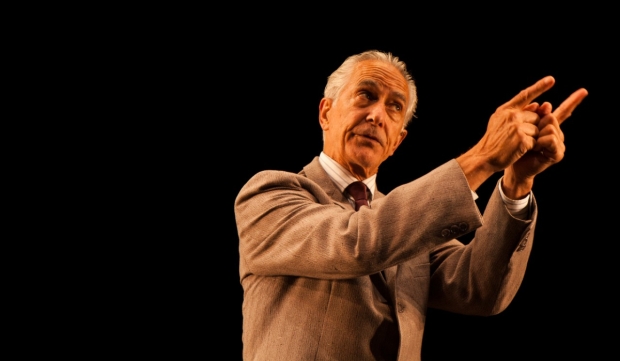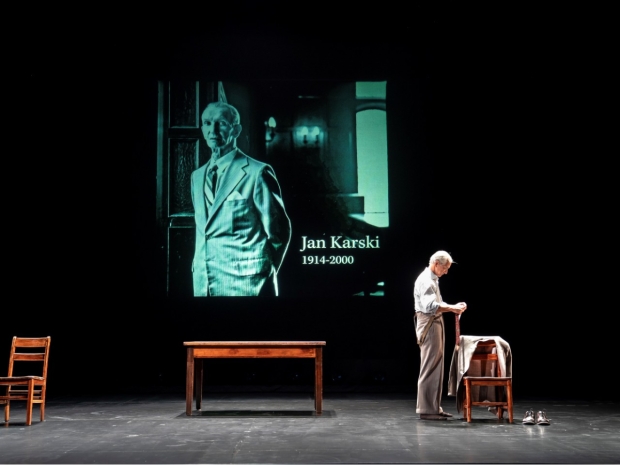Review: David Strathairn Recreates a Famous Testimonial in Remember This: The Lesson of Jan Karski
Strathairn performs this solo play as Jan Karski, an underground courier during World War II.

(© Hollis King)
"Never forget" is the common refrain echoing in every Holocaust narrative. And the plea has proved increasingly warranted considering recent statistics showing that 20 percent of Millennials and Gen Z adults in New York actually believe the Jews caused the Holocaust (the accompanying statistics are equally shocking). Work produced just within the past few years is filled with examples of playwrights circling this theme: Joshua Harmon's Prayer for the French Republic illustrated the kind of forgetting that leads to a dangerous repeated history; Tom Stoppard's Leopoldstadt (a London transplant now on Broadway) explores the loss of culture and family heritage that comes from generational forgetting; and Steven Levenson's aptly titled If I Forget let a Jewish family debate the pros and cons of hanging a cultural identity on the memory of a tragic past.
In all the intellectualizing of Jewish history, it's become rarer to see something like Remember This: The Lesson of Jan Karski — a plain testimonial (now running at Theatre for a New Audience's Polonsky Shakespeare Center) that does not ask you to ponder different angles of an argument or gently consider the other side of an "if" statement. Given the self-selecting audiences that most often buy tickets to plays of this genre, going full pathos does run the risk of falling on caring but calloused ears that have heard it all. But if this piece can somehow find its way to that growing slice of the ignorance pie chart, the clear directive placed right in the title of Remember This might be exactly what the world needs.

(© Hollis King)
Jan Karski, played by David Strathairn in an emotional and often athletic performance (movement direction by Emma Jaster), is a fitting voice for this message. A Polish Catholic who made his way from soldier to prisoner to courier for the Polish Underground resistance during World War II, Karski's job was quite literally to remember and relay his observations to the Western Allies. For 90 minutes on a sparse stage (set designer Misha Kachman provides just a wooden table and chairs), the audience bears witness to his witnessing, and feels his helplessness as world leaders from Foreign Secretary Anthony Eden to President Franklin Delano Roosevelt ignore his reports. Karski describes in great detail the cruelty, degradation, and systematic murder he saw with his own eyes on clandestine visits to the Warsaw Ghetto and an actual death camp (Zach Blane beautifully lights these solemn memories). But his meeting with Supreme Court Justice Felix Frankfurter sums up the global response to such accounts: "I know humanity. I know men. Impossible."
Co-authors Derek Goldman (who also directs) and Clark Young source much of the play's material from Karski's interviews for Shoah, the definitive 1985 French documentary about the Holocaust. The production even includes a brief clip of Karski's Shoah interview — a moment where the finely dressed, stoic man before the camera breaks down as he cracks opens the mental file on these horrific memories. Strathairn (costumed by Ivania Stack with clear biographical inspiration) captures Karski's inherent dignity and poise, as well as his abiding faith in goodness that somehow survived the war. And yet, that feeling of internal struggle — of tension in the retelling of his story — is largely lost in translation from screen to stage.
Naturally, a performance will include more…well, performing, than a raw and unsettling interview. But Remember This also wears the mission of its incubator on its sleeve. Developed in the Laboratory for Global Performance and Politics at Georgetown University, you can feel the urgency behind the mission to "harness the power of performance to humanize global politics." The play is even bookended by direct appeals to the audience from Strathairn himself (or perhaps just a neutral voice of reason called "Man" in the script). He speaks of our divided present-day world and our responsibilities within it — a preface and epilogue for our title narrator's cautionary tale. There's a candidness to it that, in some respects, I can't help but admire. After all, when a fire is raging, who has time to waste dancing around the issue? However, I also sense a bit of a shortcut through the mission statement — one that barrels right through to global politics and skips the patient harnessing that makes performance so powerful. But honestly, feel free to forget these artistic quibbles. Just Remember This.

(© Hollis King)









